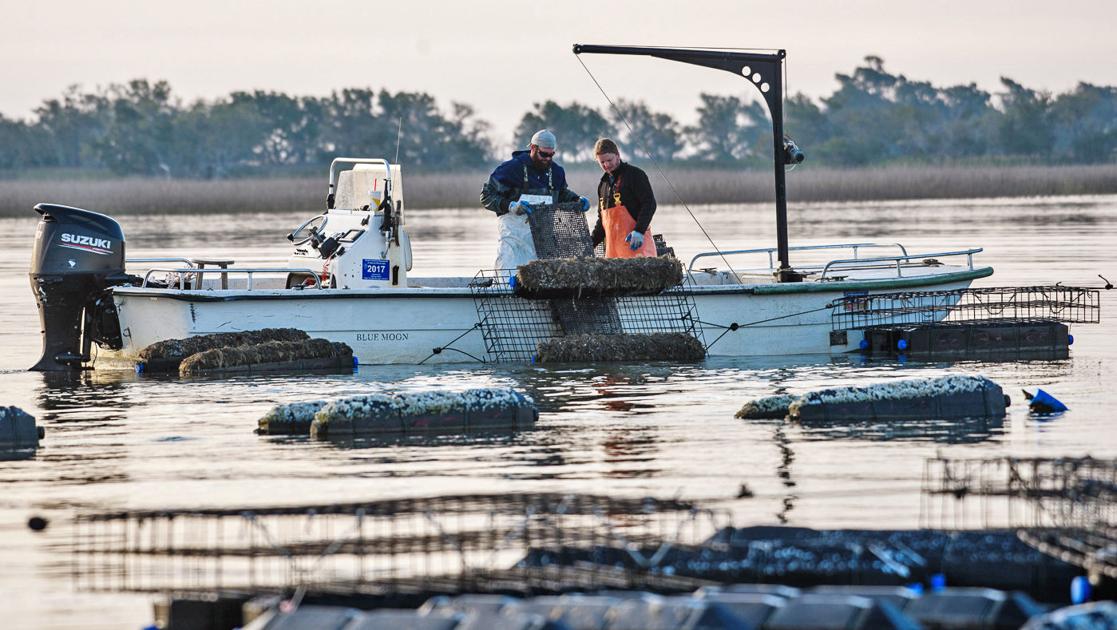A new bill introduced in the state Senate could serve to undermine the nascent oyster cage industry in South Carolina, preventing producers from harvesting bivalves for several months of the year.
But even before the bill had a hearing from the subcommittee, an ugly fight over legislation spread to a Facebook group for South Carolina sailors. State Senator Sandy Senn said “capitalists” want to profit from the state waterways with their farms, and oyster breeders say Senn is misinformed and has a personal agenda against them.
It is just the most recent conflict between farmers who raise oysters in floating cages and some neighbors and sailors who are opposed to seeing and navigating operations. Previous farms trying to obtain permits have met with intense opposition.
Senn, a Republican from Charleston, supported a move in 2017 to open the harvest in the summer months for the sterile triploid oysters used by producers. But now she says the industry has grown very fast and is often in conflict with sailors who use the state’s many kilometers of coastal streams and rivers for recreation.
“We did not anticipate what would happen to the industry in the future,” said Senn.
She said her basic bill, which now only addresses the harvest season, is likely to be amended to require more notifications about the upcoming farms for the people who live around them.
She also suggested the possibility of completely barring farms in coastal counties with a large population of sailors.

The producers, for their part, argue that they are subject to a licensing process that has lasted for years and that requires approvals from the SC Department of Natural Resources, the Department of Environmental and Health Control and the Army Corps of Engineers.
Trey McMillan, who runs the Lowcountry Oyster Co. in the ACE Basin, said there are many other commercial ventures that also use the state’s public waters, such as tour boats going to Fort Sumter, fishing boats and shrimp trawlers.
“It’s a secret approach,” he said of Senn’s effort to stop the summer harvest, which would kill farmers’ sales for five months of the year. “It’s dirty, sneaky and very misleading, what is she doing.”
Oyster farms use floating cages tied to the bottom of a river or stream bed, and producers regularly remove the mollusks while they are growing to spin them in drums that shape and classify them. These additional bivalves also help to filter the water column, as the beds of wild oysters are decreasing across the state.
There are eight agricultural operations along the state’s navigable waters at the moment, said the two state agencies that review the licenses, and one operation in the middle of seeking approval for a site on a tributary of the Edisto do Norte River. The DNR said the exact location is a trade secret and cannot be disclosed, while DHEC has revealed that it is in Privateer Creek, in the marshes behind Seabrook Island.
Operations must be kept away from official navigation channels and may not occupy more than one third of the width of the waterway.

Some of these farms operated before the summer harvest ban was lifted four years ago. Julie Davis of Ladys Island Oyster, one of the first farms, said it was a challenge to stop harvesting crops that were ready for the market in the warmer months.
Davis, also chairman of the SC Shellfish Growers Association, said he had no problem getting along with recreational boaters.
“What I have seen from the nautical community is that they are not opposed to us,” said Davis.
Several oyster breeders have met Senn in the past, she and the producers said, to solve their problems. But the senator wrote in a letter to DNR in early March that she wants to “slow down these ventures” until the state law is changed. Senn was particularly irritated by the recent approval of a new farm at Green Creek, near the Stono River.
Senn lives in the Stono and usually embarks in the area.
“We don’t just walk on Intracoastal, we like to get on our boats and go down one of those streams. This is part of the fun and part of the beauty,” she said.
Senn and his Senate colleague Chip Campson, R-Isle of Palms, had previously asked two state agencies to keep them informed of the development of oyster farms. Campsen did not return several phone messages asking for comment.
It is not clear how far the farms represent a danger to navigation. Senn said he heard from at least one man who hit a cage he didn’t see in the water, disabling his boat.
David Lucas, a DNR spokesman, said agency officials were unable to recall an incident in which a boat collided with a floating oyster cage. The agency does not investigate minor incidents with minor damage, and not all collisions are reported to DNR.
Talk to Chloe Johnson at 843-735-9985. Follow her on Twitter @_ChloeAJ.
